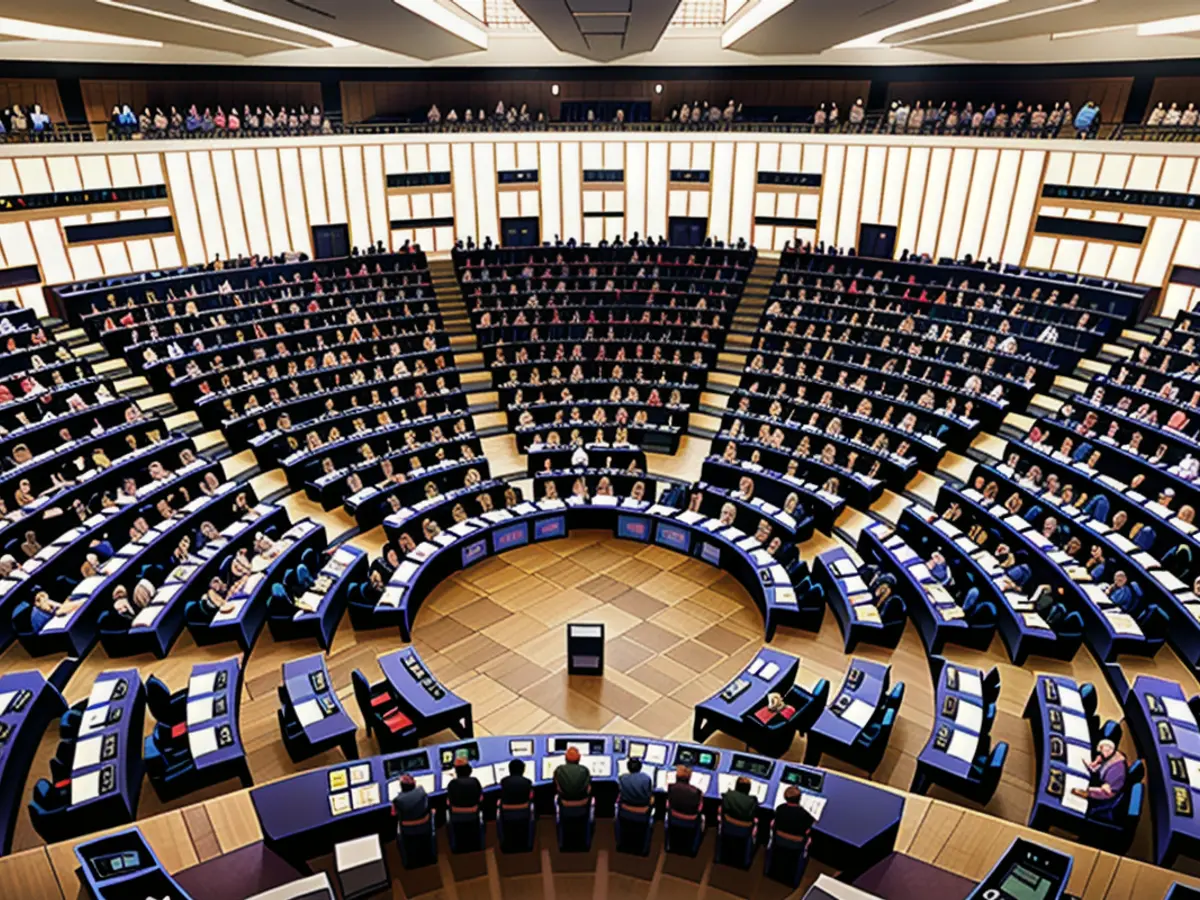upcoming European elections in 2024 - EU initiatives focused on climate, weaponry, and reforms are set to dominate in the forthcoming years.
The European Union is set to hold its elections on June 6, with voting scheduled for June 9 in Germany. In total, 720 seats in the European Parliament are up for grabs for the next five years. This newly formed parliament will play a significant role in determining the political direction of the EU over the coming years.
Together with the Heads of State and Government of the member states (known as the European Council) and the Commission, the parliament negotiates and decides on laws that shape European politics and regulate the EU market predominantly populated by approximately 450 million people.
Here is a rundown of the key objectives expected to shape the legislative period:
A Climate-Neutral EU by 2050
The EU aims to become climate-neutral by 2050, meaning emissions will equal the amount absorbed through natural processes like photosynthesis or will be offset by carbon capture technologies. EU Commission President Ursula von der Leyen has pledged €100 billion in investments towards environmental protection during her term. However, some members within the European People's Party (EPP), her faction, have become more wary of the green agenda in the wake of previous farmer protests. Manfred Weber, the EPP faction leader, recently indicated they would critically evaluate the green initiatives after the European election. Despite this, the goal of achieving a climate-neutral EU by 2050 should remain.
An Energy Union
The mission is to support the energy transition within the EU by developing an Energy Union. Priorities include facilitating a sustainable and secure energy supply at reasonable costs for European citizens, improving supply security, promoting decarbonization, and fostering integration within the internal energy market. The EU Commission had already outlined a strategy in 2015, but the crisis caused by Russia's invasion of Ukraine in 2022 has brought this agenda back to the forefront.
Enhancing Competitiveness
To compete with the US and China in the realms of green technologies and artificial intelligence (AI), the EU must reinforce its internal market. Examples of proposed reforms presented by former Italian Prime Minister Enrico Letta at an April summit include accelerated EU-wide investment opportunities in stocks and the introduction of a straightforward cross-border savings product for small investors.
Capital Market Union
To strengthen the EU's internal market, Enrico Letta put forward plans for a Capital Market Union. They included facilitating faster EU-wide stock investments and creating a user-friendly cross-border savings product for small investors. This financial union aims to cooperate on issues like insolvencies, corporate taxation, and stock exchanges to improve Europe's fiscal setup.
Strengthening the Arms Industry
In the years ahead, the EU's arms manufacturing industry must be bolstered to maintain its position as a global leader in defense. Proposals include modernizing the defense sector, increasing research and development, and fostering greater cooperation between member states.
Long-Term Budgeting
A multi-annual financial framework, coupled with a European recovery fund offering aid to struggling member states, will help ensure the EU's financial stability.
Interior Reforms
International reforms, including streamlining decision processes, enhancing the efficiency and effectiveness of its institutions, and fortifying the rule of law, are crucial to make the EU more streamlined and successful.
Following the April summit, EU leaders endorsed the previously proposed reforms. Various smaller countries, however, raised concerns about potential European financial supervision and harmonized corporate taxation. Olaf Scholz, the German Chancellor, emphasized the importance of a Capital Market Union to generate more private funds for investments. Scholz plans to present his reform plans alongside French President Emmanuel Macron.
Capital Market Union
The primary objective of the Critical Market Union is to provide the necessary financing to achieve these objectives. Additionally, it seeks to tackle the pitfalls of the fragmented European financial markets, a notable challenge in comparison to the more dynamic financial markets in the United States and Asia. The Capital Market Union has captured the attention of policymakers for years, but significant hurdles remain due to stark national laws. Differences exist in areas such as insolvency laws, the taxation of capital gains, and stock exchanges. While France has suggested bringing together a small group of EU countries, Germany prefers an inclusive approach covering all EU nations.
All EU Heads of State and Government expressed their support for a Capital Market Union at the April summit. Yet, several smaller countries expressed reservations over elements like a European financial supervision and the harmonization of corporate taxation. Scholz, the German Chancellor, ascribed priority status to developing a Capital Market Union so as to mobilize more private capital for investments.
The existing European Commission has come up with a planned billion-dollar undertaking for the European arms industry. The money for this initiative will be obtained from the European Union's budget between 2025 and 2027, as was declared in March. Besides this, it urges the European Union member states to jointly secure at least 40% of their military hardware by 2030. Furthermore, part of the confiscated Russian assets should be expended on weapon acquisition for Ukraine. Commission President Ursula von der Leyen also wants to develop the position of a defense commissioner if she wins re-election. However, German government representative Steffen Hebestreit expressed some reservations regarding these plans from the German government.
Negotiations on a long-term budget
The European Parliament is expected to collaborate with national governments to negotiate and decide on a mid-range financial arrangement for the period of 2028 to 2034. This budget currently stands around 1.1 trillion euros. Those in the know and experts predict a probable hike and a reassignment of funds. This mainly concerns transformed expenditure priorities, and also to deal with potential EU expansion over the next few years through the admission of countries like Montenegro or North Macedonia.
EU influential figures and a few heads of state propose fundamental restructuring before major nations, like Ukraine, can join the club. In the coming five years, the parliament will have a significant impact on shaping these rearrangements. The overhaul of the common agricultural policy and the alignment of living standards in the diverse member states are at the crux of these reformation efforts. Chancellor Scholz is also a supporter of these changes. He strongly advocates for the abolition of unanimity in crucial areas like foreign and security policy, as this would lead to specific nations impeding or delaying critical decisions.

Read also:
- The upcoming European elections in 2024 will have an impact on the EU's approach to various issues, including climate, energy, and defense.
- In the run-up to the elections, key objectives such as a climate-neutral EU by 2050, an Energy Union, and enhancing competitiveness are expected to dominate the legislative period.
- The EU aims to become climate-neutral by 2050, with EU Commission President Ursula von der Leyen pledging €100 billion in investments towards environmental protection.
- The goal of achieving a climate-neutral EU by 2050 faces criticism from within the European People's Party (EPP), with Manfred Weber indicating they would critically evaluate green initiatives after the European election.
- Germany, as a major EU member, will play a crucial role in shaping the upcoming European Parliament's political direction, with elections scheduled for June 9.
- The EU and its member states, including Germany and France, must strengthen their arms manufacturing industry to maintain their global leadership in defense.
- The USA has been noted as a competitor in the realms of green technologies and artificial intelligence, necessitating the EU to reinforce its internal market for competitiveness.
- Enrico Letta, former Italian Prime Minister, has proposed reforms for a Capital Market Union to provide financing for EU objectives and tackle fragmented European financial markets.








